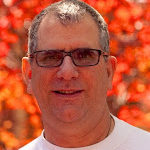In 1996, while living and working in Cleveland, Ohio, I was diagnosed with a carotid body tumor - a rare, usually benign growth almost always occurring in men over forty. I was forty one at the time. The otolaryngologist, Dr. Harvey, explained that the risks of cutting along the artery wall were “stroke, hemorrhage or death.” Needless to say, I was anxious about these outcomes but I was physically fit and in excellent health and so the surgery proceeded.
The operation was successful but the next morning when I tried to get out of bed to use the facilities I slumped over. The left side of my body felt like it weighed a thousand pounds and I couldn’t get myself back on the bed. All of a sudden lights came on and I heard an alarmed nurse’s voice say, “Oh my God he’s stroking. Get ENT stat.” (I had once been a hospital chaplain and I knew what stat meant - RIGHT NOW!). I remember thinking, how can this be? Strokes are for old people. And then chaos ensued. In the course of twenty four hours I was rushed through hospital corridors for numerous procedures. When all was finished I woke to face the sad fact that the left side of my body was completely paralyzed and that a piece of my skull had been removed to reduce dangerous brain swelling. Although I lost my sight the instant the stroke hit, what little came back was ineffectual because I couldn’t get my glasses on over the bandages on my head.
To compound my physical problems I began to be awash in anxiety every time something new or different happened to me. I was only able to relax when my family or friends were at my bedside. My pastor and the hospital chaplain were greatly supportive as well.
After almost two weeks in neurosurgical intensive care at University Hospitals of Cleveland, I was transferred to a rehab unit in the suburbs. The challenge awaiting me there was to learn how to function again. And again there was the anxiety: would I ever be able to walk again or use my hand? I woke up anxious in the morning, remained anxious through the daily rounds of therapy, and went to bed anxious again at night. Even something as simple as a nursing shift change made me uneasy. I was constantly struggling to find comfort and support. Dr. Nem, the chief physiatrist (rehab specialist) put me on ativan and ordered the hospital psychologist, Dr. Souter, to see me regularly, but just as before, my main comfort came from my caring friends and family - even a few hospital workers too.
The first thought of suicide crept into my mind during my final weeks in Rehab One. As the days drew closer to my release I began to look at going home as not just another anxiety-provoking event I would have to face, but as a real threat to my well-being. Suicide seemed like a good solution. I did confide my feelings to Dr. Souter and my friend Bill, but every time I brought up the subject he would say, “Suicide is a permanent solution to a temporary problem,” but to me that logic seemed backward. I was seeking a temporary solution to a permanent problem: I couldn’t move the way I used to, couldn’t take care of myself the way I needed to, couldn’t see clearly when I wanted to. I was leaving one prison - the hospital - for another - my home. But the real prison that I couldn’t escape was myself. I was trapped inside my own body.
I found it hard not to hate myself for what had happened to me - a tiny blood clot moving up my right carotid and killing off a portion of my brain. - and so, already anxious and depressed, I began to feel despondent. Sitting alone at home with nowhere to go and nothing to do, I would sit for hours with my chin in the palm of my right hand, and obsess about my fate.
To be continued . . .

Rev. Grant F. Sontag
The Rev. Grant F. Sontag is a United Church of Christ minister, author and teacher. For eight years he served on the UCC national staff in Cleveland, Ohio where he developed, wrote or edited numerous resources for older youth and adults. He has been on the UCC Disabilities Ministries board of directors and worked in several different mental health settings, including hospital psychiatric units and a halfway house for young adults transitioning from hospital back to community. He makes his home in the San Francisco Bay Area.
